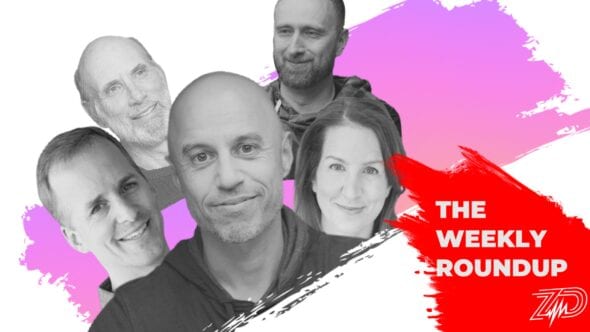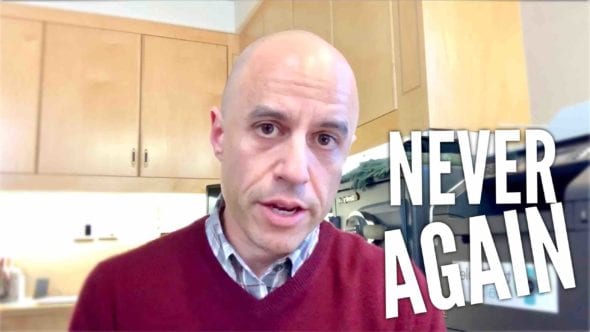Nothing wrong with a plant-based diet, but documentaries like “The Game Changers” distort science.
Here’s how to avoid getting suckered by nutritional “fake news.” See also our take on What The Health.
Thanks to Dr. Peter Attia for providing this great resource on how to think about interpreting nutritional studies.
More (not-so) fake news: we’re now offering YouTube SuperPac membership options to support the show and get exclusive content. Click here!
It’s me, Zubin Damania. Check it out. Fake news. It’s actually not fake. What they do in fake news is they take data and they cherry pick it, and they turn the statistics to say whatever it is they’re trying to say. And when you look at nutritional studies and nutritional reporting and documentaries like this newest one, The Game Changers, about how going vegan, having a vegan diet is the way to get ripped, that it’s got Arnold Schwarzenegger on there. “Ever since I cut out meat, look at me I’m so swoll.”
Ah think twice. The way people interpret nutritional studies, and the way the press does it is truly fake news. And this is why. Let’s take a look at the vegan thing. In this documentary, they talk about all these different studies. And my friend Peter Attia has written extensively about this. I’ll link out to it. The problem with these studies, when you’re comparing a vegan diet, which is, hey look it’s a great diet, but it’s an elimination diet. You’re taking stuff out of the diet. What are you comparing it to typically? The standard American diet or SAD.
And we know what’s in that. Yeah there’s meat, but there’s also gooey dairy deserts. There’s also McDonald’s. There’s hella McRib in the standard American diet. So you’re comparing what is pretty much universally acknowledged as the worst diet in the history of mankind. And the reason we know that is we have an “epidemiologic study” of 300 and some odd million Americans whoa re fatter, sicker, more diabetic, and are dying, and any time we export this diet to the rest of the world they die too. You’re welcome world. America number one. Iran PTOOIE!.
So the truth is when you compare that crappy diet to a vegan diet, who’s gonna win every time? It’s gonna be the vegan diet, assuming You even do a study that makes any sense. And this is the second problem. Any time you compare vegans, say, or anyone on a very restrictive diet to the rest of the world, you have something called the healthy user effect or healthy user bias. Vegans are some of the most health conscious people on the planet. They care about he environment. They care about what they put in their bodies. They care about their yoga. They meditate. They’re woke, right? At least that’s what they’ll tell you to your face every time at the party to try to make themselves feel bigger than you. And it works.
So the truth is, when you’re comparing this really healthy group to a standard group, there’s a ton of biases. Some of them you can adjust for in the multivariate analysis. And some of them you can’t. And even when you can adjust, it’s hard to do. There’s a lot of bias you don’t even see. There’s less smoking. There’s more exercise. There’s more meditation. All these other things make it really, really darn near impossible to tease these out unless you do a randomized control trial, where you put one group into just eating vegetables and vegan stuff, and the other group into eating whatever diet you’re comparing it to. And it’s very hard to do that because you have to put people in cages and control everything they eat for years.
And when we look at nutritional data, most of it is not randomized control trials, it’s these observational epidemiologic studies where you follow one group and you follow another group. You ask them questions. What did you eat over these years, and what happened? And then let’s look at the relative risk of dying, say.
And here’s an example. So soft drinks. With soft drinks they did this big study in Europe, like 400 odd thousands Europeans, and at the beginning of a 16-year study they said hey, how many soft drinks do you drink per year? And how many of them have sugar, and how many of them don’t? And they got that data at the beginning of this trial. And at the end of the trial, they assumed that people drank the same number of soft drinks, that they were truthful and actually remember how many soft drinks they drank in the beginning.
And then they did an analysis and said oh look, the group that drank artificially sweetened beverages, so like Diet Coke, had a, I don’t know 20% greater risk of dying than the group that drank say no beverages. And let’s say it was a 10% greater risk of dying than the group that drank sugary soft drinks like Coke. And of course it’s all over the news. Diet drinks more deadly than sugary drinks, that are more deadly than no drinks. And it made massive news. But then you look at how the trial was done. First of all they asked this question at the beginning of a 16 year trial and never really followed up to did this stuff change. How are people, I can’t remember what I ate yesterday, people. How are people in these trials gonna remember anything. Okay, so that’s problem number one.
Problem number two is you cannot adjust for all the confounders. So people who are drinking diet drinks, are they dying because they’re drinking diet drinks or are they dying more because they’re drinking diet drinks because there was already something wrong. They were overweight, they had other health problems, etc. There’s a million potential confounders. Now here’s the craziest part. So this relative risk of say, let’s say 20%, so it’s 20% more likely you’re gonna die if you drink diet drinks over a 16 year period. Okay, that’s a relative risk. In these studies, you need to look at absolute risk. So how many people actually died in the normal group versus the group that you’re studying, and what’s the difference in absolute numbers of deaths.
And it turns out, well if you have, let’s say we have a 50% increased relative risk of dying, in the first group, out of a million people 10 people died. And in the second group, out of a million people, 15 people died. That’s like 50% increased relative risk of dying. But the absolute risk of dying is still tiny, and the difference between the groups is five people per a million. And then you start to go wait a minute, could that be explained by these confounding effects that we’re not measuring? And the answer is almost assuredly.
So immediately you can kind of throw out most traditional studies, most of the stuff you read about. Now by comparison, remember they never did randomized control trials on cigarette smoking. They figured it out this way. They did the same thing. They asked people questions. Do you smoke? Do you not smoke? And look what happened. But guess what the differences were there. A relative risk of dying of 10,000% when you smoke, and an absolute risk of dying of like 1,000 versus like one. So that’s pretty powerful kind of correlation. Enough that you can kind of assume causation. But that’s not what we see in most other studies. So guys, when you’re watching the fake news, when you’re reading garbage in print or you’re watching a documentary like Game Changers that was really well done, and if you wanna save animals and help the environment, that’s all wonderful and great, but if you’re trying to be healthier by saying that only a vegan diet or only a keto diet or only whatever diet’s gonna help you, you’re absolutely misunderstanding the science and you’re cherry picking it and you’re creating fake news. The best thing you can do is to understand look, the standard American diet is probably garbage. And if you find a diet that works for you, talk to a professional, a nutritionist, a doctor, do the best you can for your personal beliefs, genetics, and sort of behavioral tendencies and something that’s sustainable. And that’s the best we can do right now because honestly we just don’t have enough good data to say more than that.
So that is the take home. Share this. I love you vegans. Namaste. Also I love you keto guys ’cause I like that fat. And I don’t know if Tom Hinueber you wanna go get like Mickey D’s or you wanna hit Burger King or In and Out, what’s up?
– Epstein didn’t kill himself.
– He was suicided by the Clinton’s. That’s one thing, there’s no, that’s a fact.
– That’s not fake news.
– That’s not fake news.
– That’s real. That’s real as balls.
– I see you Bill. I saw a deer on the street the other day and it was dead. It was almost dead and in it’s dying breath I listened to it, and I was like what’s up fam? And he goes let me tell you what the Clinton’s did. And then you heard this and then nothing. Nothing. Fake news.
– Suicided.
Related Videos
Category
- The ZDoggMD Show (799)
- Featured Videos (188)
- Doc Vader (142)
- Against Medical Advice (128)
- Medical Humor (95)
- Public Service Announcements (87)
- Music Parodies (74)
- Nurses (59)
- Meditation (38)
- ZVlogg (36)
- The VPZD Show (31)
- ZTalks (28)
- ZBlogg (24)






